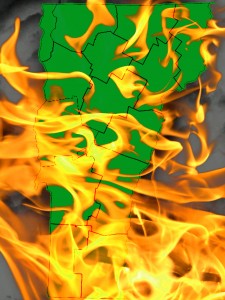 Those of us working to build preparedness among farmers and farm communities to withstand a highly contagious animal disease disaster like foot-and-mouth disease (FMD) often get questions along the lines of these:
Those of us working to build preparedness among farmers and farm communities to withstand a highly contagious animal disease disaster like foot-and-mouth disease (FMD) often get questions along the lines of these:
- “Don’t the veterinarians already have a plan in place to deal with such an outbreak?”
- “Doesn’t the state Agency of Agriculture and Vermont Emergency Management have plans?”
Of course they do. I think it’s reasonable to say our local, state, and federal vets know their roles. Our animal health folks know what their authorities are. They are ready to respond.
Realistically, however, most large-scale disasters are beyond the scope of a plan to easily contain. The more people who are prepared to do their part the better. There is no doubt a highly contagious animal disease emergency could be a disaster. Farmers need some knowledge of the responses that state and federal authorities would make so they can factor the impact of those actions into their own plans.
Let’s use a wild fire as an analogy to a highly contagious disease event. The fire may be first identified in a specific area and resources will be directed at containing and controlling the fire. High winds can move fire beyond the fire breaks or in unexpected directions. Just as fire needs air and fuel and travels with winds, contagious animal diseases affect susceptible species brought in contact by animal movements or movements of people and equipment. Airborne spread is also possible with FMD. The challenge with FMD is that you can’t feel or see it smoldering as it incubates in recently infected animals. The responders go put out the fire – cull animals where disease has been diagnosed – and try to figure out where it might pop up next — the fires smoldering at other facilities – and contain the disease there, too. Unless our veterinarians are possessed with special powers, they are unlikely to get it exactly right. This is why community- and commodity-wide preparedness as promoted by this project would go a long ways toward keeping the fire from burning out of control.
(*First posted on Jan. 4, 2011*)


It’s always good that the neighboring clinics in your area are ready for emergencies or disasters. When I transfered here, the first thing I did was to check which ones offer emergency veterinary in Geneva commonly known here as urgence veterinaire Geneve 24/7 so I’ll know where to run in cases like these. But of course, a program for proper awareness and preparedness supported by the local government is still the best way to combat such problems like FMD. We should all be ready!
Jamie C.
Urgence Veterinaire Geneve